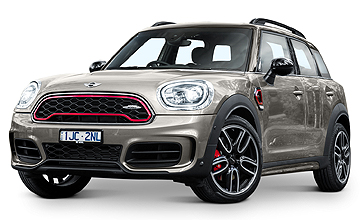BY DANIEL DEGASPERI | 17th Aug 2017

And so the prospect of a second-generation Mini Countryman John Cooper Works (JCW) – of a now German-owned company heaping a decades-old pedigree onto the rump of a small SUV that shares its bones with a BMW X1 – once again would at first seem optimistic or simply contrived.
However, the original Mini was a humble family car of the time. If anything today’s new Countryman JCW could just be the equivalent of that first challenge of taking a small hatch and turning it into something sporty: by now making a high-riding small SUV feel slick and slinky.
The Countryman JCW is not cheap nor humble in specification, but it also promises to be roomy and practical, yet quick and dynamic. So can it become today’s family hack-turned-racer?Drive impressionsBMC’s original Mini was renowned for its innovation, and within the small-SUV segment the second-generation Mini Countryman does not trade any practical smarts for its fashion focus.
This flagship $57,900 plus on-road costs JCW brings with it the sizeable storage bins, big back seat and semi-premium soft-touch cabin plastics of its more affordable siblings, while adding obligatory red exterior trim items and stripes, large 19-inch alloy wheels, and sportier seats and steering wheel.
Mini buyers apparently will not cross-shop the Countryman JCW with similar $60,000 offerings, but pragmatically it is difficult not to draw comparisons from the start.
With a 2.0-litre turbocharged four-cylinder petrol engine powering all four wheels via an eight-speed automatic transmission, the claimed 6.5-second 0-100km/h matches that of the BMW X1 xDrive25i and Volkswagen Tiguan 162TSI.
To the latter, add $4000 for an R-Line bodykit and adaptive suspension, and $2000 for adaptive cruise control and lane-keep assistance, which are standard here, and the 162TSI is suddenly a $54,490 proposition.
A $60,700 X1 xDrive25i – which uses the same platform as this Mini – gets electric adjustment for the front seats, which is optional here, but misses the 19s and adaptive suspension, active cruise control, adaptive auto high-beam and Apple CarPlay all featured on the JCW for $2800 less.
Identically priced to the BMW, a Mercedes-Benz GLA250 scores electrically adjustable and heated front seats and a panoramic sunroof that add $3250 to the JCW – but it is six-tenths slower to triple-digit speed, and the Mini’s standard active cruise control and auto park-assistance are options.
The point of digesting all this first is that the Countryman JCW might have just landed in a small SUV sweet-spot for buyers making their way from a Volkswagen (or Subaru Forester XT) to a BMW or Mercedes-Benz. Conversely, some of the Benz’s kit should arguably be standard here.
Either way this loftiest Mini brings with it a tall seating position with space to spare front and rear. There are even back-seat air vents, a reclining backrest, a sliding bench and an electric tailgate that opens to reveal a capacious, and two stage adjustable, boot floor.
The form-hugging front seats allow the chunky three-spoke steering wheel to fall nicely to hand, with the combination of Mini’s bright 8.8-inch colour touchscreen (with navigation, voice control, USB, Apple CarPlay, digital radio) and head-up display with tachometer feeling very high-end.
Just think of this as a funkier BMW, draped in Mini design flair.
The turbo engine is an absolute delight when paired with the eight-speed automatic transmission, too. Perhaps it does not feel quite as brisk as its claim would suggest, nor as aggressive and characterful as past JCW-badged vehicles might promise, but in an SUV context it is ‘balanced’.
That is, balanced between refinement and a rorty soundtrack that, in Sport mode, delivers obligatory pops and crackles on overrun – albeit distantly. In fact, that word follows the Countryman JCW around wherever it goes, from low urban speeds, to cross-country blasts on bitumen or gravel.
Gone is the razor-sharp steering of old JCW models. The Countryman’s is nicely mid-weighted, direct and progressive, however it feels more like a good, generic setup that could adorn any SUV.
Likewise, the handling response through the front-end is reasonably agile and grippy, while the rear-end delivers adept traction out of tight hairpins in the soaked conditions of the national media launch, all the while feeling hugely competent, unfussed and quite simply large-hatchback-esque.
Equally, however, it never feels outwardly engaging or overtly sporty, so much so that this could (or perhaps should) wear a Cooper S badge. But that is also the way the JCW Hatch, Convertible and Clubman feel. Long gone is that wound-into-the-ground, stand-on-nose dynamic disposition of old.
For family buyers the upside is, of course, two-mode suspension that delivers sweet compliance in Comfort mode, teamed with a fraction too much vertical movement over country roads that is all too easily resolved in Sport. And that latter setting is never, ever harsh. Balanced is the word…So while the Countryman JCW does not doff its hat to the original, race-bred Minis in any sense, nor does it even reflect on the character of the reborn first- and second-generation JCW versions.
What it does is mix BMW drivetrain and dynamic resolve, with a nicely roomy and clever cabin, and lots of characterful design detail throughout – and for its target market, with the exception of some price and kit issues, that leaves it as an appealing sort-of-performance small SUV contender.